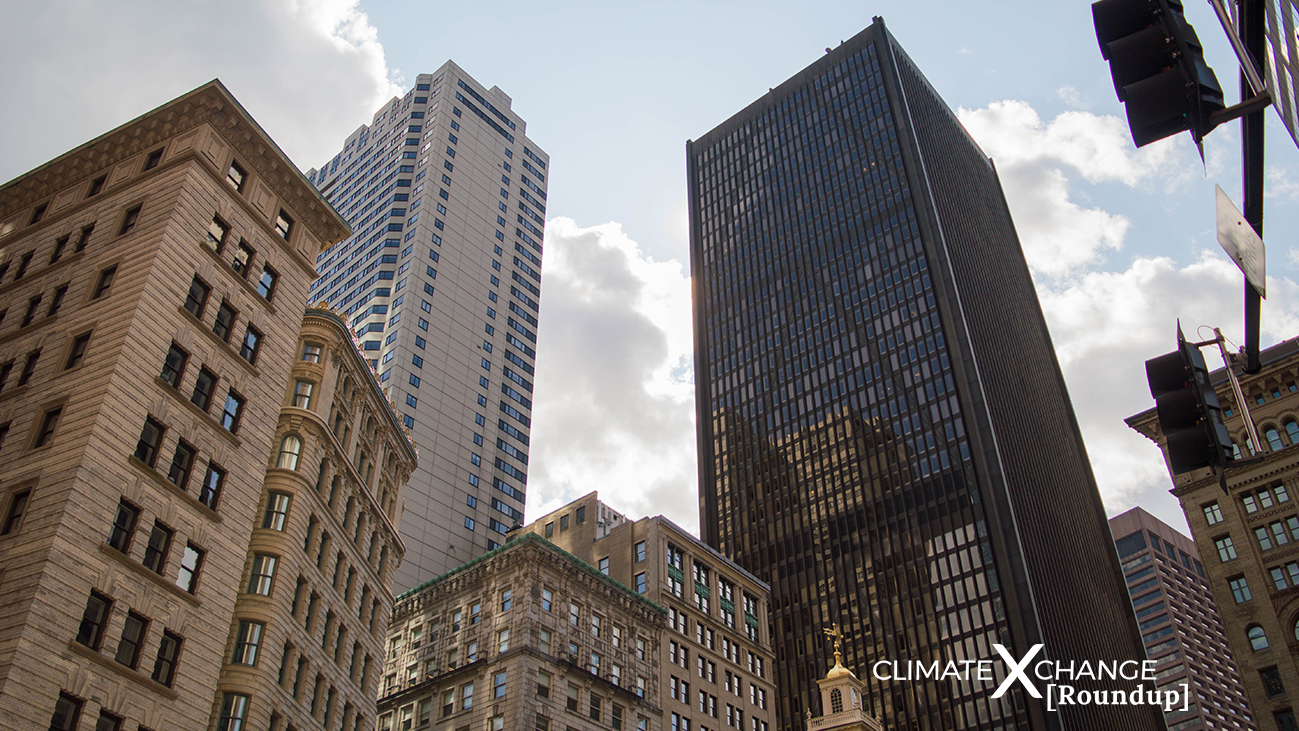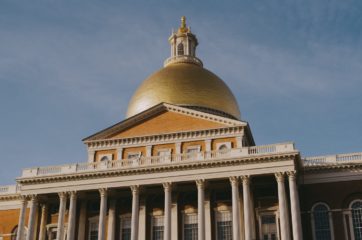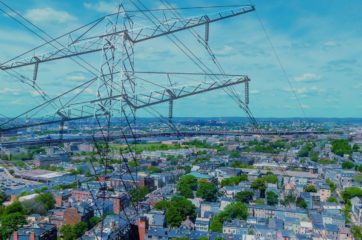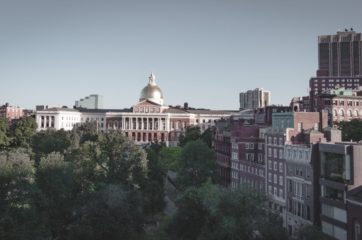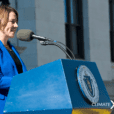[ Not a subscriber? Sign up here ]
BEACON HILL HAPPENINGS
– “Koch academic influence returns to Massachusetts with new Tufts University think tank” (Dana Drugmand, Nation of Change): [read]
– “National Grid Lobbied Against Massachusetts Bills to Expand Renewable Energy” (Itai Vardi, Energy & Policy Institute): [read]
– 22 days since the climate conference committee convened… and no word still on any progress made by the 6-member committee on reconciling the Senate (S.2500) and House (H.4933) climate bill versions.
ALL POLICY IS LOCAL
– Deep Dive: Boston Councilor Wu’s plan for a Green New Deal: Last week (8/17), Boston City Councilor Michelle Wu released a document entitled, “Planning for a Boston Green New Deal and Just Recovery.” The 49-page plan outlines the need, process, and steps Boston can take to realize its own Green New Deal. This week Roundup talked with Nina Schlegel, the report’s lead author and the Director of the Global Center for Climate Justice.
Tim Cronin [TC]: The report lays out 15 detailed policies, but starts out by describing the ideal process for achieving them. Why is this, and what’s the importance of process in an effort like this?
Nina Schlegel [NS]: “How you do things matters just as much as what you do. Procedural justice matters because our governments have a duty to work in the best interest of residents. If planners and city personnel believe they know what is best for a community and fail on process, we end up with development plans that deepen existing social and environmental injustices and deny the aspirations of residents for a more resilient city.
The Green New Deal report is actually part of a longer process. It builds on longtime community advocacy and the innovative solutions implemented in other cities and links them together under a broader transformative agenda. This report is intended to be an inspirational document to get us here in Boston (and frankly other cities and communities around the U.S.) to move from thinking in issue-area siloes to thinking intersectionally about how these issues overlap. Now is the time for us, collectively, to have substantive conversations about these ideas. What policies and structural changes make the most sense for Boston? Do they reflect our values? What are some concrete actions we can take? How do we make this vision of a GND a reality? And in what kinds of principles should we center this work? The report is about taking the conversation to the next level. Councilor Wu also filed an order last Monday for a hearing on implementing a local Green New Deal, so there’s a legislative side to this too, which goes hand in hand with the community conversation piece.”
[This conversation continues below in the “LOCAL CLIMATE SPOTLIGHT” section at the bottom of the Roundup.]
– “New Bedford terminal wins staging contract with wind turbine companies” (Southcoast Today): [read]
LOCAL IDEAS
– “This is a great look into how utilities wield their power on Beacon Hill” by Benjamin Downing, via Twitter & the Thread reader app.
– “How Climate Risk Could Be the Perfect Conservative Argument for Climate Action” by Kirian Mischke-Reeds, via Climate XChange.
– “Sign on to prevent biomass pollution ” by Anna Gyorgy, via the Greenfield Recorder.
OUR LOCAL ENVIRONMENT
– “Alleging ‘environmental racism,’ residents protest plan to remove scores of mature trees in Roxbury” (David Abel, Boston Globe): [read] [$]
– “Public Can Weigh In On Toxic Waste Cleanup Plan In The Berkshires Until Mid-September” (Nancy Eve Cohen, New England Public Media): [read]
– “Rare Orchid Found 19 Years After Disappearing From Mass.” (Colin A. Young, SHNS via WBUR): [read]
2020 CLIMATE
– “Climate Change Takes the Stage at the Democratic National Convention” (Carlie Clarcq, Climate XChange): [read]
– “Sunrise Movement slams Nancy Pelosi for endorsing Joe Kennedy’s primary challenge against incumbent Ed Markey” (Nik DeCosta-Klipa, Boston.com): [read]
BEYOND THE BAY STATE
– “Despite Deep Ties to Fossil Fuels, Texas Sets Its Sights on Clean Energy” (Joshua Burns, Climate XChange): [read]
LOCAL CLIMATE SPOTLIGHT
Conversation with Nina Schlegel
Director of the Global Center for Climate Justice, on her work writing Boston Councilor Michelle Wu’s Green New Deal & Just Recovery PlanTim Cronin [TC]: This plan is not a traditional climate/energy plan, instead it heavily focuses on how these ideas intersect with broader justice issues. Can you describe some of those intersections?
Nina Schlegel [NS]: “So often cities plan and operate in departmental silos. The window for having a chance to address the climate crisis is closing, coupled with the most dire public health emergency in 100 years and a reinvigorated movement for racial justice – these have all brought to the fore a political and economic system built on structural racism and economic injustices that threatens us all. We do not have the luxury anymore of operating with blinders on to how various issues are interrelated. It is past time we realize the deeply intersectional nature of our concurrent crises. And a critical part of that work is acknowledging how our systems and our institutions have created inequality: through redlining, urban renewal, and the inequitable distribution of services like public transit and amenities like greenspace. People who live in urban heat islands now pay more for energy to keep themselves cool. This is an outcome of unjust policy choices. Many families can no longer afford to live in Boston because we are prioritizing luxury development over affordable housing. So these residents now have to drive into the city, which is more time-consuming and expensive. That is an outcome of unjust policy choices. Research out of Harvard has shown that communities with higher levels of air pollution like Chelsea also have higher rates of Covid-19 mortality. Concentrated pollution in low-income neighborhoods and communities of color is the outcome of unjust policy choices. Some $18 billion in public money that could have been used to make the city resilient was instead invested in the Seaport to prop up luxury development. Yet it will be one of the first areas consistently flooded by sea level rise in the coming years. This is the result of unjust policy choices. If we want to set ourselves up to be as resilient as possible for climate change and an uncertain future, it means realizing that climate justice is also about achieving racial and economic justice.”
[TC]: How do you imagine this plan connecting with similar efforts in other cities, as well as those on the state and federal levels?
[NS]: “This report is the first of its kind in the nation. I consider it a first step in realizing a brighter future for Boston and showing the unique power of cities to bring about structural change and deliver on the promise of a GND. It’s really a reorientation of how we should see the role of local government and institutional power: as a force for climate justice. Ultimately, one of the primary reasons for creating this report is to inspire other cities to action by showing them what is possible and the innovative, resilient, just solutions already being implemented elsewhere. Other cities have already implemented their own versions of GND-like plans, like New York City, Los Angeles and Seattle. But our plan is unique in that it is explicitly about addressing our current urban crises and the future crisis of climate change in a way that seeks to dismantle and rectify past injustices that have left us unprepared for the present moment. Boston also has a history of being an innovative urban leader. Boston built the first public library and the first subway. This is another opportunity to lead the way for the rest of the country. There is such a desire given where we find ourselves right now. We have an opportunity like never before to conscientiously approach the intersections of health, community wealth, climate change, systemic racism, and urban planning. What we do here in Boston can also inspire state level enabling legislation, and draws inspiration from regional efforts such as the RENEW New England Alliance.”
[TC]: What part of this plan is the most exciting to you?
[NS]: “We have long needed a radical rethinking of our systems, but the quadruple force of this brutal pandemic, the threat of climate change, over 400 years of racial oppression, and widening economic inequality brings renewed urgency. The future that is unfolding before our eyes is a bleak one, but we do not need to let it become reality. Some policy-makers have been satisfied with incremental changes and achievements, but the pandemic and its cascading impacts have really blown the lid off that narrative. We understand now that incrementalism is not enough. So what excites me most about this plan is the transformational nature of the policy demands. The plan provides a vision that can give people hope and inspiration to join this call for action. Ultimately – and this is the essence of the report: we built these systems. Our societies, politicians, generations before – we built all of this. We need to realize the very real, enormous power that we have to transform it all and build a new system that bends towards social, economic, and environmental justice.”
[TC]: Can you describe the history of this plan, why it was created?
[NS]: “The report draws inspiration from the federal GND, which is a broad vision for a ten-year mobilization. But the resolution is not specific. And we wanted to show exactly how change can happen at the local level – to really show how possible and achievable a Green New Deal and Just Recovery can be. Cities in fact have enormous powers to influence resident’s quality of life. They can act quickly, and democratically. And that is exactly what we need right now: a broad, transformative agenda.
We started this project by hosting a Green New Deal breakfast back in October that brought together over 60 individuals, organizations and local policy experts to discuss what kinds of policy ideas and principles inform a local Green New Deal. We’ve had many conversations since. The report draws on local research including City Life/Vida Urbana’s recent report on the eviction crisis and Climate XChange’s Businesses Acting on Rising Seas Report, and details the successful policy innovations that are taking place in other cities. This vision is very possible, very pragmatic. Thinking intersectionally and thinking long-term also makes economic sense too. We wanted to combine all of this great knowledge to highlight how a Green New Deal must meet the moment by addressing our preexisting urban issues, and through policy examples, show how we might solve them.”
ROUNDUP REDUX
Missed the last CXC Roundup? Here are the top three climate headlines from last week:
- 14 days and counting: climate conference committee update:
- Councilor Michelle Wu launches her own Boston Green New Deal & Just Recovery plan:
- “New Coalition Will Promote Offshore Wind”
Read the full Roundup here from August 20th, 2020 here.
FOR MORE CONTENT from us subscribe to the Climate XChange Newsletter (Fridays, weekly) and check out the Cooler Earth podcast (new episodes coming soon!).

